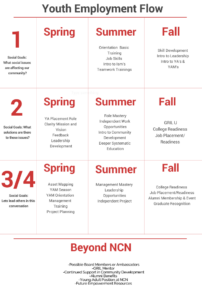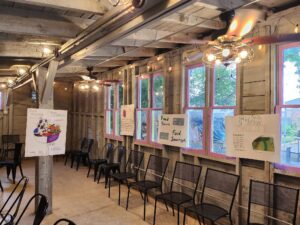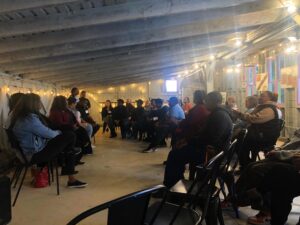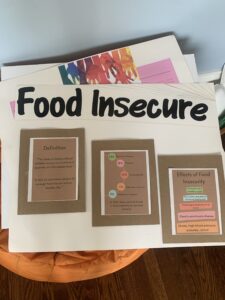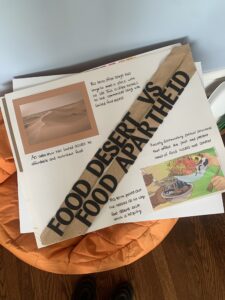Final report for YENC23-198
Project Information
This project will introduce 30 high school youth annually to a career in sustainable farming and value-added production. Youth will be offered employment in our farm or café social enterprise where they will gain hands on skills in farming and food production. Employment will be coupled with weekly curriculum that will be relatable to urban youth. Youth will engage in topics like racism and sexism in the food system, food sovereignty, food accessibility and go on field trips to Black and Brown food entrepreneurs. Youth will then host community events to share lessons learned to other youth and the community.
- Provide 60 youth employees positions in farming and value-added production to urban high school youth in order to offer hands-on learning experiences in sustainable agriculture.
- Attend 4 field trips to Black and Brown leaders in the food system so that urban youth of color see themselves represented in the sustainable food industry.
- Provide interactive curriculum around racism and sexism in the food system so that urban youth have a lens to analyze their involvement in the food system.
- Youth employees will present lessons learned through the project at a small farm conference and on social media.
- Youth employees will plan and lead two community events to showcase lessons learned to the surrounding community.
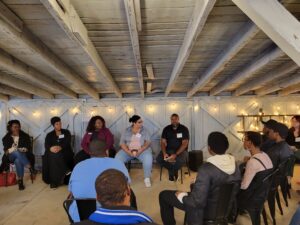
2022 Youth Led Panel Discussion on "Isms" in the Food System.
Educational & Outreach Activities
Participation summary:
As part of our project, we organized three youth-led community events in (two in 2023 and one in 2024). Our youth employees spent the summer researching and visiting local farms, after which they planned panel events with local food system leaders. The youth created posters showcasing their understanding of concepts such as food sovereignty, food apartheid, food desserts, and food inequality. They also helped choose the panelists for each event and prepared questions for the panel discussions. Additionally, the youth assisted in preparing food for the events. Each event was very successful, and our youth were able to further their learning while showcasing their work.
In 2024, we hosted a USDA tour with approximately 50 educators in attendance, we hosted the Michigan State University Student Organic Farm Training Program with approximately 35 farmers in attendance, and we were a bus tour site for the Great Lakes Fruit & Vegetable Conference with approximately 100 farmers and 40 educators in attendance.
We are scheduled to present at the Michigan Family Farm Conference on March 15 in Kalamazoo, Michigan, on this project and our youth employment program. We anticipate 50 farmers and educators to attend.
The above one-pager highlights our flow with youth employees over a three year period:
- Host webinar or in-person workshop
- Present at education conference
Learning Outcomes
Importance of food sovereignty
Knowledge of food systems inequality
Knowledge of sustainable agriculture
Participating youth learned about and engaged in the cultural importance of sustainable food. Each field trip that the youth attended and each panel event that brought in local BIPOC food leaders inspired them to consider their own food culture. Multiple youth stated that they had never considered the importance of growing their own food as part of their cultural identity.
The key strength to our curriculum was that it was engaging. We find that high school youth are often resistant to formal curriculum in the summer or after school since they are overly exposed to formal curriculum in a school setting. Our aim is to have youth learn from other leaders in the food system and their peers through hands-on learning. We also find that hands-on learning is especially helpful in diverse settings. Our youth team is highly diverse across race and socio-economic status. Exploring topics directly can sometimes divide the group, whereas hands-on learning has a greater tendency to instill team unity.
The weakness of our hands-on learning style is that we don't always get into the details of sustainable agriculture growing practices.
Project Outcomes
This project was highly successful.
One of our youth employees, who identifies as an African American male, highlights the success of our program. They were on staff as a youth employee and became a young adult farm apprentice for two years. They said the following about their experience, "My experience with New City Neighbors, from being a youth employee to one of the apprentices, has been incredibly impactful. Working here has taught me not only about sustainable farming and teamwork but also the value of community involvement/building and giving back. As an apprentice, I’ve had the chance to take on greater responsibilities from my mentors, and see the positive impact I could truly make. This journey has been a powerful foundation for not just my professional growth, but personal as well." We think that our intentional exposure of young BIPOC farmers and food entrepreneurs was a pivotal component of this youth's experience of being inspired to enter the field of sustainable agriculture.
Another current youth employee has been with us for two years and has taken on the role of leading our "front of house" customer service relations with our Cafe. This participant said about their experience, "I found a new part of myself that I didn’t even know I had. I became happy and grew my mind to new ideals and perspectives that I wouldn’t have imagined possible. New City Neighbors is welcoming and inspiring."
